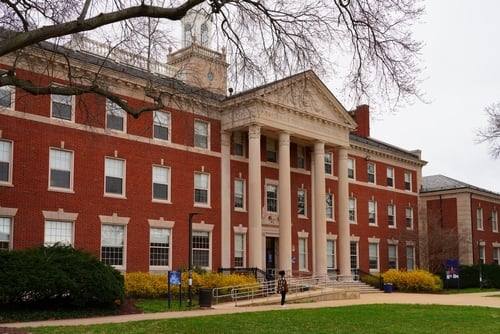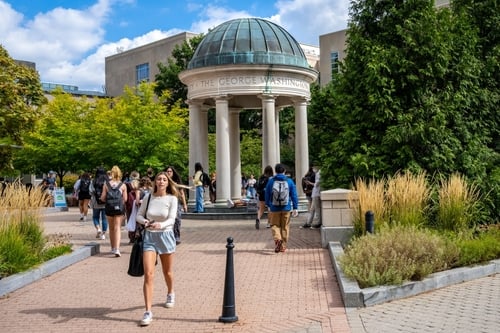There are plenty of ways to invest in real estate and several different strategies for investors to explore. One method some investors explore is investing in student housing. This can be a lucrative choice for several reasons, including consistent demand, long-term stability, and potential for appreciation. However, there are also some potential downsides. Read along as we go over some of the pros and cons of investing in student housing near Washington DC universities.

Contents of This Article:
- What Is Student Housing?
- Why Buy Rental Housing Near Universities?
- Pros and Cons of Investing in Student Housing
- Tips for Investing in Student Housing
- Manage Your Investment Properties With Ease
What Is Student Housing?
Starting college is a significant milestone for many people. Additionally, it’s also the first time many young adults leave home and live on their own, sometimes far away from their families. That said, student housing is an essential component of a college education.

Student housing refers to residential accommodations that university or college students can choose as an alternative to on-campus housing. Usually, student housing can be found in close proximity to the college campus or in other parts of the city where you can find more affordable housing.
While most colleges and universities offer on-campus housing, like dormitories, not every student wants to go that route. As such, off-campus student housing is a great option for students who want more privacy and independence. Today, we’ll go over why investing in student housing can be a profitable choice for landlords and tips for rental property management in Washington, DC.
Why Buy Rental Housing Near Universities?
Investing in rental housing near universities can be a strategic decision for several reasons. Here are some of the top reasons investors look at student housing as a profitable investment strategy.
- Long-Term Stability- Universities are typically long-standing institutions with stable enrollment, which can give rental investors a sense of long-term stability. This stability can be appealing, especially in markets where other industries may experience more volatility.
- Diverse Tenant Pool- University communities often include a diverse tenant pool, including students, faculty, and staff. This diversity can provide flexibility and reduce reliance on a single demographic.
- Potential for Appreciation- In areas with growing universities, property values may appreciate over time due to increased demand for housing. That said, investing in a location with potential for future growth can lead to capital appreciation.
- Proximity to Amenities- Properties near universities are often located in areas with convenient access to amenities like public transportation, shopping centers, restaurants, and cultural attractions. This can make the area more attractive to tenants.
Universities Near Washington DC
Knowing which universities are out there is helpful if you’re looking to invest in student housing near Washington, DC.

That way, you can find opportunities for student housing near popular universities.
- Georgetown University
- George Washington University
- American University
- Howard University
- The Catholic University of America
- Gallaudet University
- Trinity Washington University
Pros and Cons of Investing in Student Housing
Like any investment strategy, investing in student housing has several pros and cons. Here are some of the main considerations for investors looking at student housing near Washington DC universities.
Benefits of Investing in Student Housing
- High Rental Demand- There’s typically a consistent demand for student housing, especially in areas with universities and colleges. Students need housing during the academic year, providing a reliable tenant base for landlords.
- Reliable Rent Payments- Many students don’t have enough of a credit history to qualify for standard rental requirements. As such, parents or guardians often co-sign leases or may even directly pay the rent for their student. This can provide a sense of financial security for property owners.
- Potential to Charge More- Investing in student housing means you can potentially charge more for rent since there’s higher demand near college campuses. For instance, you could rent per room instead of renting the entire unit to one tenant.
Disadvantages of Investing in Student Housing
- Seasonal Vacancies- Student housing may experience vacancies during the summer or other breaks when students return home. This can potentially result in income gaps and may require creative leasing strategies.
- Higher Turnover- Students often move in and out at the end of the academic year, leading to higher turnover rates. This can increase the time and money spent on advertising, screening, and preparing the property for new tenants.
- Potential for Property Damage- Students may be more likely to cause wear and tear on the property, leading to potential maintenance and repair costs. As such, it’s crucial to conduct thorough background checks and establish clear lease agreements.
Tips for Investing in Student Housing
Investing in student housing can be an excellent investment strategy for investors who want to attract college students and earn a steady stream of income during the school season. Here are some tips if you’re thinking of investing in student housing.
- Research the Local Market
- Require a Sizable Security Deposit
- Require a Co-Signer
- Budget for Marketing and Maintenance
- Hire Professional Property Management
Research the Local Market
First and foremost, no matter where you’re investing, it’s crucial to research and understand the local rental market. For instance, if you’re looking at student housing, look at that specific market to understand the demand for rental properties, average rental rates, and vacancy rates. Additionally, it may help to look at the specific universities or colleges in the area and their enrollment trends.
Require a Sizable Security Deposit
College students may not be as responsible as older adults or seasoned renters.

As such, you may want to protect yourself and your property by requiring a steep security deposit. Now, laws may limit the amount you can charge for a security deposit, depending on where your rental housing is. For instance, in Washington, DC, you typically cannot charge more than one month’s rent as a security deposit. However, in other areas, like Baltimore, you can charge no more than two months’ rent.
Require a Co-Signer
Renting to students can be a liability for landlords, as they may not have a lengthy credit history or experience with rental housing. As such, you may want to require a co-signer before signing a lease with them. When you require a co-signer on the contract, they’re legally liable to step in and pay the rent if the student cannot pay.
Budget for Marketing and Maintenance
As previously stated, tenant turnover in student housing is generally higher than in other rental properties. As such, property owners should account for marketing and leasing expenses, like advertising, tenant screening, inspections, and preparing the property for new tenants. Additionally, investors may want to prepare for higher maintenance or repair expenses. You may find that first-time tenants are rougher on the property than more seasoned renters.
Hire Professional Property Management
Investing in student housing can take a lot of work and due diligence–especially if you own multiple properties or have multiple tenants living in one. As such, if you don’t have time to handle the day-to-day operations, you may want to hire professional property management. That way, you’ll have an experienced employee to answer tenant inquiries, maintenance requests, inspections, and more.
Manage Your Investment Properties With Ease
If you’re thinking of investing in student housing, you’ll want to consider how you’ll manage your properties. After all, renting to students can differ from renting to seasoned adults regarding tenant screening, maintenance, management, and more. So, if you need help navigating the ins and outs of student housing, consider hiring a professional property management team.
Need More Advice? contact us today!
Bay Property Management Group offers comprehensive rental management services, helping landlords navigate every process seamlessly. From rental marketing to tenant screening, inspections, and maintenance–we’ve got it all covered. So, if you’re looking at investing in properties near Washington DC, Baltimore, Philadelphia, or Northern Virginia, contact BMG today.
